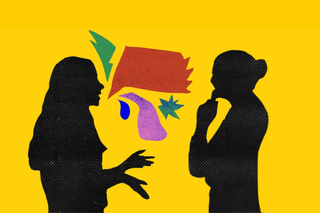
Why It Can Be Easier to Open Up To a Stranger Than a Friend, Family Member
The absence of attachment with a stranger — coupled with the lack of repercussions for our disclosures — heralds a sense of relative safety.

Pouring our hearts out to a stranger on the park bench, a co-passenger on a flight, or someone at a bar can sometimes seem easier than opening up to the closest of friends. It’s a curious dance of human interactions, where vulnerability and anonymity come together serendipitously. The explanation lies in a combination of psychological, sociological, and neuroscientific factors that govern the phenomenon.
“[T]here’s something you’ve been dying to get off your chest but you don’t want to live in the reality of a world where this secret is not. If you share it with a stranger, you release the tension and still keep your personal world away from it,” journalist Kaitlyn Wylde wrote in Bustle. “When you know you won’t see the person again, you’re a little too comfortable. You’ll literally tell them anything in the world.”
“Maybe we’re perfect strangers. Maybe it’s not forever. Maybe intellect will change us. Maybe we’ll stay together. Maybe we’ll walk away. Maybe we’ll realize… We’re only human,” goes a 2016 song named “Perfect Strangers.” The repeated use of “maybe,” points to just how uncertain we know our dynamic with strangers is. This uncertainty ushers in a certain ease; the judgement of strangers matters little because it’s unlikely one will cross paths with them again.
The absence of attachment we feel towards a stranger during our interactions, coupled with the fact that there are hardly any repercussions, lead to a sense of relative safety, encouraging emotional expression and disclosure. When talking to strangers, one can share highly personal information without damaging their reputation within one’s social circle.
Related on The Swaddle:
Why Trying To ‘Control’ Your Partner Into ‘Opening Up’ Doesn’t Work
Social connections built over time come with assumptions, judgments, and expectations, which can inhibit individuals from fully expressing themselves; our interactions with strangers lack the baggage of these dynamics. “[O]ur closest relationships are our most complex ones,” states an article on Quartz. “A spouse is a friend, often a co-parent, also a lover, and hopefully, an advocate of our work. A mother has your entire life’s history in her head. When we need comfort, we’re unsure which of their roles these people might play — and wary that it might be a role that gives us something other than the unconditional support we’re looking for in the moment. So, we confide in someone else altogether.”
Conversations with strangers can thus allow us to re-examine our lives through a new lens. Strangers offer the unique advantage of providing fresh perspectives and objective viewpoints, offering unbiased advice and impartial opinions.
“Strangers allow us to get out of our heads… They break up that negative self-focus, and prevent the train of negative circular thinking,” explains psychologist Louise Lambert.
Perhaps that’s one of the reasons many benefit from support groups; they find solace in the validation and support offered by strangers, which they were otherwise denied by the people in their lives.
Related on The Swaddle:
Turns out, opening up to strangers is good for us. “[S]ince encounters with strangers are generally characterized by low conflict, they are likely to elicit kind, prosocial behaviors,” writes psychologist Noam Shpancer in Psychology Today. “[T]he psychological benefits of social support… may serve to attenuate the effects of stress and offer one a sense of purpose, hope, and meaning, thus nurturing psychological resilience.”
That doesn’t, however, mean that we’d be able to open up and be our authentic selves with every Tom, Dick, and Harry we cross paths with. Honest, no-holds-barred interactions with strangers typically occurs in contexts where either one’s anonymity is preserved or the stakes for future interactions are low.
What also makes it easier to open up to strangers is that we don’t necessarily have to worry about bookending everything we say with social niceties. This also increases the appeal of the advice we might receive from strangers in return: they can be blunt in their takes because they too don’t have to worry about the way we might feel about their responses.
“Surely it depends on what context you meet, but if you’re sitting at a bar, telling your bartender you cheated on your partner, he’s probably not going to make you feel better about it. Maybe that’s what you need,” notes Wylde. “This person doesn’t know you. They don’t know your reputation. They don’t know how people think of you and the value of your word. It’s nice to talk to someone who can speak to you without knowing your baggage or holding a bias.”
This is also why Reddit — a social networking site that allows users to operate under a veil of anonymity or pseudonymity — fosters the kind of conversations it does. Unlike Instagram and Twitter, where we’re playing up the events of our lives to appear “cool,” “happy,” and “intelligent” to our followers, we tend to be a lot more authentic on Reddit — albeit with a corresponding spate of disadvantages.
As Oskar Tokarski wrote: “It’s relatively normal to feel at ease while talking to strangers and feel uncomfortable when you’re talking to people you’re close with. We all are building walls around our hearts and minds. We don’t want to hurt, feel rejected, unwanted, or disliked.”
Devrupa Rakshit is an Associate Editor at The Swaddle. She is a lawyer by education, a poet by accident, a painter by shaukh, and autistic by birth. You can find her on Instagram @devruparakshit.
Related


Sizzle This: A New Twitter Won’t Fix the Discourse
